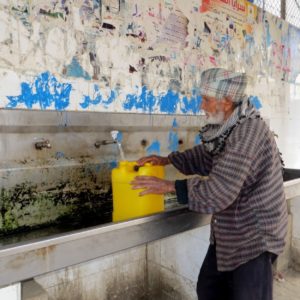The Stream, July 12: Irrigation, Crop Yields Will Drop In U.S. Hotspots Under Climate Change
The Global Rundown
Crop yields in certain regions of the United States could take a significant hit as climate change reduces the water available for irrigation, a new study found. The cholera outbreak in Yemen may worsen the country’s food crisis, according to humanitarian officials. Proposed coal plants in Myanmar face stiff opposition over water and land concerns. An increase in the rate of land-clearing in Queensland could create more sediment pollution on the Great Barrier Reef. The U.S. Environmental Protection Agency is reconsidering the fate of a major gold and copper mine in Alaska that opponents worry would destroy salmon fisheries.
“This epidemic is spreading further and faster than anything we’ve seen before. What will happen is that this cholera outbreak will in fact exacerbate the conditions and the threat of famine in more places than ever in the country.” –Jamie McGoldrick, the United Nations’ humanitarian coordinator for Yemen, expressing concern that the country’s cholera outbreak could take resources away from efforts to prevent a famine. (Reuters)
By The Numbers
1,280 megawatts Capacity of a proposed coal plant in Myanmar, which would increase the country’s electricity generation by 25 percent. The plant and other coal projects have been opposed due to concerns about land and water, putting their future in question. Reuters
In context: Protests over water safety, bank financing rock Bangladesh coal plants.
300,000 hectares Amount of land cleared each year in Australia’s Queensland state since 2013. Some of the areas cleared could increase sediment runoff and pollution on the Great Barrier Reef, according to an analysis by WWF. Guardian
Science, Studies, And Reports
Cotton grown in Arizona, maize grown in Utah, and hay grown in the Northwest are all crops that could see significant declines in yield by 2050, according to researchers at MIT. They found that climate change stress on water supplies in these regions will cut irrigation, leading to the declines. MIT News
On The Radar
The U.S. Environmental Protection Agency has proposed an action that could allow the Pebble gold and copper mine to move forward in Alaska’s Bristol Bay watershed. The agency previously moved to halt the mine project due to concerns about its effect on streams and salmon fisheries. The Washington Post
In context: EPA’s proposed veto of Alaska’s Pebble Mine in line with past uses of the Clean Water Act.
A news correspondent for Circle of Blue based out of Hawaii. She writes The Stream, Circle of Blue’s daily digest of international water news trends. Her interests include food security, ecology and the Great Lakes.
Contact Codi Kozacek





